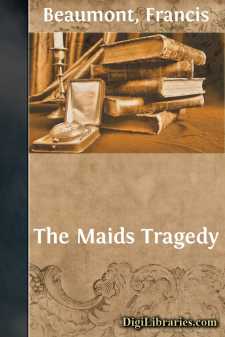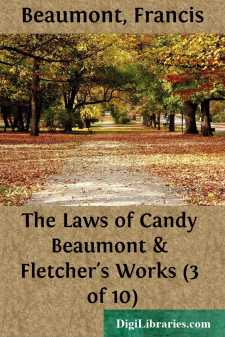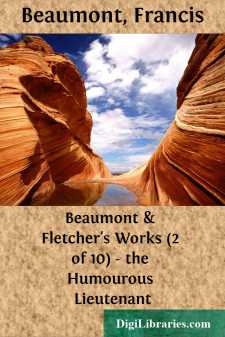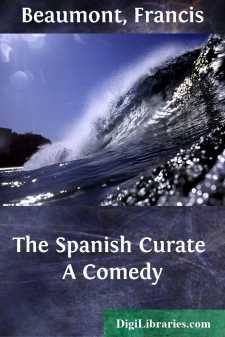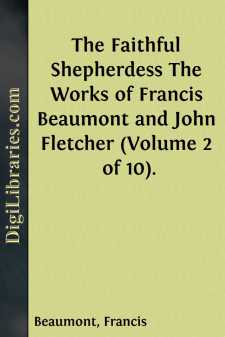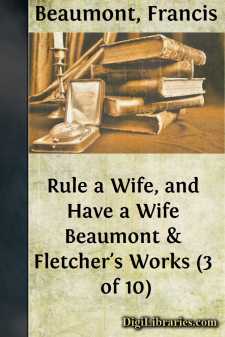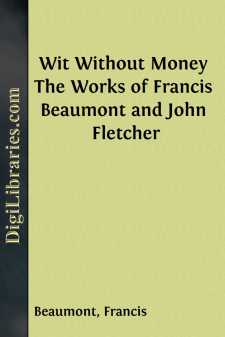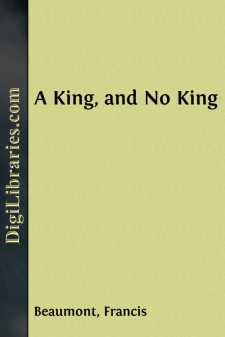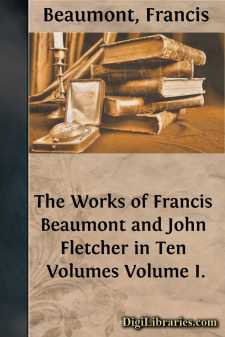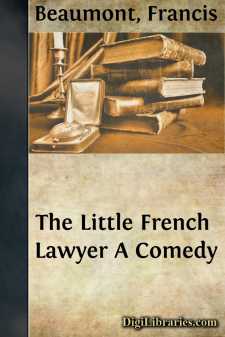Categories
- Antiques & Collectibles 13
- Architecture 36
- Art 48
- Bibles 22
- Biography & Autobiography 815
- Body, Mind & Spirit 144
- Business & Economics 28
- Children's Books 18
- Children's Fiction 14
- Computers 4
- Cooking 94
- Crafts & Hobbies 4
- Drama 346
- Education 58
- Family & Relationships 59
- Fiction 11833
- Games 19
- Gardening 17
- Health & Fitness 34
- History 1378
- House & Home 1
- Humor 147
- Juvenile Fiction 1873
- Juvenile Nonfiction 202
- Language Arts & Disciplines 89
- Law 16
- Literary Collections 686
- Literary Criticism 179
- Mathematics 13
- Medical 41
- Music 40
- Nature 179
- Non-Classifiable 1768
- Performing Arts 7
- Periodicals 1453
- Philosophy 65
- Photography 2
- Poetry 896
- Political Science 203
- Psychology 44
- Reference 154
- Religion 515
- Science 126
- Self-Help 85
- Social Science 82
- Sports & Recreation 34
- Study Aids 3
- Technology & Engineering 59
- Transportation 23
- Travel 463
- True Crime 29
Francis Beaumont
Francis Beaumont (1584–1616) was an English playwright and poet renowned for his collaborative works with John Fletcher, particularly in the realm of Jacobean drama. Their partnership produced several significant plays, including "The Maid's Tragedy" and "Philaster," which were celebrated for their intricate plots and vivid characterizations. Beaumont's solo works and contributions to the dramatic canon have left a lasting impact on English literature, despite his relatively short life.
Author's Books:
Sort by:
by:
Francis Beaumont
THE MAIDS TRAGEDY. Francis Beaumont and John Fletcher Persons Represented in the Play. King. Lysippus, brother to the King. Amintor, a Noble Gentleman. Evadne, Wife to Amintor. Malantius} Diphilius} Brothers to Evadne. Aspatia, troth-plight wife to Amnitor. Calianax, an old humorous Lord, and Father to Aspatia....
more...
by:
Francis Beaumont
Actus PrimusScena Prima Enter Gaspero, and Melitus MelitusSir, you're the very friend I wish'd to meet with,I have a large discourse invites your earTo be an Auditor. GasperoAnd what concerns it? MelitusThe sadly thriving progress of the lovesBetween my Lord, the Prince, and that great Lady,Whose insolence, and never-yet-match'd Pride,Can by no Character be well exprest,But in her only...
more...
by:
Francis Beaumont
ACTUS PRIMUS. SCENA PRIMA. Enter 2 Ushers, and Grooms with perfumes. 1 Usher. Round, round, perfume it round, quick, look ye Diligently the state be right, are these the richest Cushions? Fie, fie, who waits i'th' wardrobe? 2 Ush. But pray tell me, do you think for certain These Embassadours shall have this morning audience? 1 Ush. They shall have it: Lord that you live at Court And...
more...
by:
Francis Beaumont
Actus primus. Scena prima. Enter Angelo, Milanes, and Arsenio. Arsenio. Leandro paid all. Mil. 'Tis his usual custom,And requisite he should: he has now put offThe Funeral black, (your rich heir wears with joy,When he pretends to weep for his dead Father)Your gathering Sires, so long heap muck together,That their kind Sons, to rid them of their care,Wish them in Heaven; or if they take a tasteOf...
more...
by:
Francis Beaumont
Actus Primus. Scena Prima. Enter Clorin a shepherdess, having buried her Love in an Arbour. Hail, holy Earth, whose cold Arms do imbraceThe truest man that ever fed his flocksBy the fat plains of fruitful Thessaly,Thus I salute thy Grave, thus do I payMy early vows, and tribute of mine eyesTo thy still loved ashes; thus I freeMy self from all insuing heats and firesOf love: all sports, delights and...
more...
by:
Francis Beaumont
Actus PrimusScena PrimaEnter Juan de Castro, and Michael Perez. Michael PerezAre your Companies full, Colonel? Juan de CastroNo, not yet, Sir:Nor will not be this month yet, as I reckon;How rises your Command? Michael PerezWe pick up still, and as our monies hold out,We have men come, about that time I thinkWe shall be full too, many young Gallants go. Juan de CastroAnd unexperienced,The Wars are dainty...
more...
by:
Francis Beaumont
Actus primus. Scena prima. Enter Uncle and Merchant. Merc. When saw you Valentine? Uncle. Not since the Horse-race, he's taken up with those that woo the Widow. Mer. How can he live by snatches from such people? he bore a worthy mind. Uncle. Alas, he's sunk, his means are gone, he wants, and which is worse,Takes a delight in doing so. Mer. That's strange. Unc. Runs Lunatick, if you but...
more...
by:
Francis Beaumont
Actus primus. Scena prima. * * * * * Enter Mardonius and Bessus, Two Captains. Mar. Bessus, the King has made a fair hand on't, he has ended the Wars at a blow, would my sword had a close basket hilt to hold Wine, and the blade would make knives, for we shall have nothing but eating and drinking. Bes. We that are Commanders shall do well enough. Mar. Faith Bessus, such Commanders as thou may; I...
more...
by:
Francis Beaumont
TO THE READER. Poetry is the Child of Nature, which regulated and made beautifull by Art, presenteth the most Harmonious of all other compositions; among which (if we rightly consider) the Dramaticall is the most absolute, in regard of those transcendent Abilities, which should waite upon the_ Composer; who must have more then the instruction of Libraries which of it selfe is but a cold contemplative...
more...
by:
Francis Beaumont
Actus Primus. Scena Prima. Enter Dinant, a[n]d Cleremont. Din. Disswade me not. Clere. It will breed a brawl. Din. I care not, I wear a Sword. Cler. And wear discretion with it,Or cast it off, let that direct your arm,'Tis madness else, not valour, and more baseThan to receive a wrong. Din. Why would you have meSit down with a disgrace, and thank the doer?We are not Stoicks, and that passive...
more...


